
This week is Acupuncture Awareness Week – the aim to raise the profile of acupuncture as a valid healthcare choice, used to help manage a range of conditions. But what is acupuncture and how does it work?
Here, we take a look at some common ways acupuncture is used at goPhysio in Chandlers Ford.
What is acupuncture?
Acupuncture is an ancient Chinese therapy which involves inserting very fine needles into the body to help remedy a huge variety of conditions. With a 2,500 year history and a growing body of medical research confirming its effectiveness, acupuncture has now been widely accepted by western healthcare. Although acupuncture is often sought out as a last resort after all ‘normal’ treatments have failed it is fast becoming one of the most popular complementary therapies in the UK with 2.3 million acupuncture treatments carried out each year.
What can acupuncture help?
Traditional acupuncture can treat a huge range of conditions from infertility to anxiety. At goPhysio, we commonly use acupuncture as a treatment for pain such as back pain, headaches, muscle and tendon problems and osteoarthritis of the knee, as these conditions have all been shown to have some evidence that they respond to acupuncture. Because acupuncture is a calming treatment it can also help promote a feeling of general relaxation and well-being, aiding sleep which is useful in many long term pain conditions.
Acupuncture usually works best with combined with other treatments such as exercise or hands on therapy, therefore it’s rarely used as a stand-alone treatment at goPhysio.
Is acupuncture the right treatment for me?
Your therapist will ask you a series of questions to help determine whether acupuncture is right for you. These include asking about your medical history and of course about any phobia of needles! A few reasons we might not use acupuncture include a history of epilepsy, blood clotting disorders, infection or if you are pregnant. As physiotherapists we have many treatment options for all conditions so if acupuncture is likely to help your condition your physio will recommend it but if you’re not a fan of needles that’s fine too – we have plenty of other options!
How does it work?
There are many different theories – in ancient Chinese medicine they believe that acupuncture helps clear your energy channels (meridians) and restore your natural balance of energy coming in and leaving the body (yin and yang). In western medicine research has shown that acupuncture can help to ‘switch off’ the body’s pain response by giving it an alternative sensation which blocks out the barrage of pain signals to the brain. It also releases chemicals such as endorphins and natural opioids which are both pain-relieving substances as well as improving circulation to the healing area. Acupuncture is known to promote relaxation of tight knots (trigger points) in the muscles and has a general calming effect on the central nervous system by lowering your heart rate and blood pressure.
How long are the sessions and how many will I need?
Acupuncture can be included in your normal physiotherapy or sports therapy appointment, so depending on what your therapist is treating you for, they may leave the needles in for anything from 5 – 30 minutes. Your first session of acupuncture is usually slightly shorter to see how you respond but the length of treatment and number of needles used may be increased as you get used to the sensation. Most people respond to acupuncture in 4-6 sessions, however this is individual and depends on your condition.
Are they any side effects?
Acupuncture is a very safe treatment – the needles used are sterile and single use, surprisingly much narrower than injection needles. The smallest are around 0.13mm wide (about the thickness of a human hair) so most people don’t feel the needles go in. It is common to get a mild tingling, warmth or heavy feeling in the area whilst the needles are in. The most common side effect is mild bruising, however some people can feel a little light-headed or drowsy after treatment.
The risk of serious harm with acupuncture is incredibly low – a study in 2006 reviewed 4 million acupuncture treatments and found only 11 serious adverse events and zero fatalities. This makes it far safer than the majority of household medicines. Looking for an acupuncturist that has trained through an accredited organisation such as the British Acupuncture Council or the Acupuncture Association of Chartered Physiotherapists is the best way to minimise you risk as you can be sure the practitioner has undergone rigorous training.
Is there anything I should I do before/after acupuncture?
Try and eat a couple hours before your treatment, particularly if you have a condition such as diabetes where you could be more at risk of feeling faint if your blood sugar is low.
After treatment make sure you have time to sit and drink a glass of water before rushing off. You may also want to avoid driving after your first appointment in case you feel dizzy or drowsy.
Try not to plan anything strenuous such as vigorous exercise after an acupuncture session and avoid stimulants such as caffeine and alcohol for the rest of the day to enhance the feeling of relaxation from acupuncture.
If you think you could benefit from the combine approach of physiotherapy and acupuncture to help your recovery from a painful condition or injury, then give us a call or how to book.
#AcupunctureAwarenessWeek
Click to read more……






